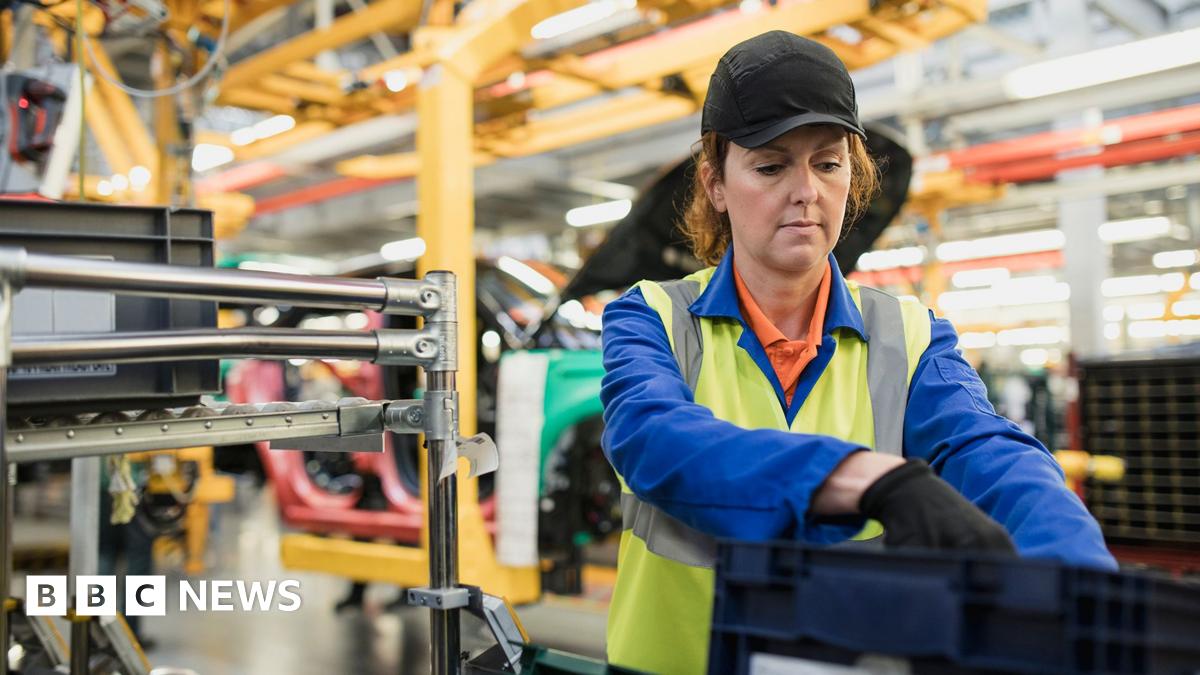
The UK economy sees slower than expected growth of 0.1% in the three months to September, the final figures before the Budget show
The Office for National Statistics says a fall in car production was partly responsible, after a major cyber attack on Jaguar Land Rover
In the month of September, the UK economy shrank by 0.1% – that's when UK car production hit a 70-year low
What is growth? In short, gross domestic product (GDP) measures how much is earned, spent and produced in the economy by companies, governments and people
The government has made economic growth a key priority – Reeves will deliver her Budget on 26 November
Edited by Sam Hancock
Alongside the quarterly figure covering July to September, the ONS has also released a separate figure for September alone.
It shows that GDP fell by 0.1% last month, meaning the economy shrank by that much.  Dharshini David
Dharshini David
Deputy economics editor
Growth makes us better off and is the government's number one mission – but these figures are a reminder that there’s a way to go before it can say "mission achieved".
Not only was growth weaker than expected but, allow for population growth, and the economy stalled over the summer.
The shutdown at Jaguar Land Rover did hit GDP in September – but even without that, performance was lacklustre.
Along with the figures, Liz McKeown, the Office for National Statistics' director of economic statistics, releases a statement.
She says: "Growth slowed further in the third quarter of the year with both services and construction weaker than in the previous period.
"There was also a further contraction in production."
She adds that there was a "particularly marked fall in car production in September, reflecting the impact of a cyber incident, as well as a decline in the often-erratic pharmaceutical industry".  Jennifer Meierhans
Jennifer Meierhans
BBC News
That's a lower figure than economists had expected and it means economic growth had slowed from 0.3% the second quarter of the year to 0.1% in the third quarter.
The UK economy saw slower-than-expected growth of 0.1% in the three months to September, official figures show.
Stay with us for more. Jennifer Meierhans
Jennifer Meierhans
Business reporter
We really want to know whether the UK economy has grown in the third quarter (July-September) compared to the second quarter (April-June).
The consensus forecast among analysts is that we'll see 0.2% growth for Q3, which is what the Bank of England’s monetary policy committee also predicted.
Pantheon Macroeconomics forecast 0.2%, but says "we see a good chance that quarterly growth will round up to 0.3%".
The company thinks the Jaguar Land Rover cyber attack – which caused UK car production to hit a 70-year low for September – "will weigh heavily on GDP, with a risk of a bigger drop than we have factored in".
But it also says "strong car registrations and retail sales should boost services, while solid growth in GP appointments and A&E admissions could boost health output".
Ahead of the figures, let's hear what Rachel Reeves was saying about growth on Monday, when she sat down with BBC Radio 5 Live's Matt Chorley.
Reeves said the UK's economic growth had not been as strong as she would like.
"The economic circumstances have declined, deteriorated since a year ago," she said, blaming "conflicts" and "trade barriers".
As a result, she will be "looking at" both taxes and spending in the Budget, she told Chorley.
She also said the principles guiding her Budget will be "fairness and growing the economy".
In the same interview, Reeves suggested she favours removing limits on benefits linked to family size, which could signal an end to the two-child benefit cap.
Tommy Lumby
Data journalist
Many economists and politicians – including the chancellor – have raised concerns this year that the UK economy is not growing fast enough.
Today's figures will give us an idea of the situation in the third quarter of the year, which covers July through to September.
In the bar chart below, you can see how the economy grew by 0.3% in Q2 – the three months to June – which was slightly better than some economists had been expecting, but still slower than the first quarter of the year at 0.7%.
You can also see the growth figures for last year and 2023.
In less than 20 minutes, when the latest data come out, we'll be able to see if growth has slowed or picked up pace since then.
The figures being published today are for GDP – Gross Domestic Product.
GDP measures how much is produced, how much is spent and how much is earned in a country's economy over time.
In the UK, new GDP figures are published every month by the Office for National Statistics (ONS).
The ONS measures GDP by taking into account the UK's output, its expenditure, and its income – but this can sometimes hide details on important aspects of living standards like inequality and living standards.
Most economists, politicians, and businesses like to see GDP growing steadily – that means people are spending more, more jobs are being created and more tax is being paid.
If GDP falls for two quarters in a row, this is known as a recession, which can lead to pay freezes and job losses.
In August, the figures showed that the economy grew by 0.3% between April and June – better than economists had expected. We were also told growth had slowed from 0.7% in the first three months of the year to 0.3% in the second quarter. Jennifer Meierhans
Jennifer Meierhans
Business reporter
At 07:00 GMT we’ll find out if the economy grew, shrank or flat-lined in the third quarter of this year – from July to September.
These figures are particularly interesting as they come a fortnight before Chancellor Rachel Reeves is set to unveil her Autumn Budget.
The Labour government has made economic growth one of its key priorities and today’s figures will be an indication of how that’s going and the challenges ahead.
Stay with us for the numbers and expert analysis on what it all means for the economy – and you.
Copyright © 2025 BBC. The BBC is not responsible for the content of external sites. Read about our approach to external linking.